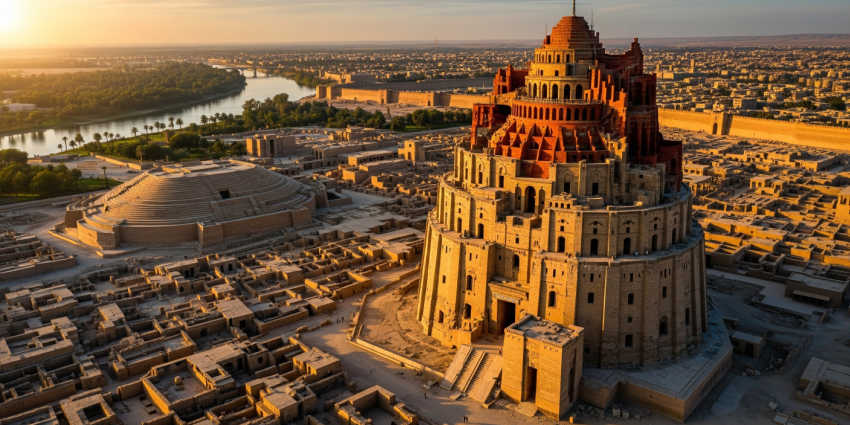What the Bible's Anti-Kingdom Means for You and I Today!
In a world increasingly marked by division, self-reliance, and a relentless pursuit of earthly glory, the ancient story of Babel and Babylon echoes with startling relevance.
Today, we dive into the profound linguistic and theological significance of "Babylon," revealing how this biblical ANTI-KINGDOM, far from being a relic of the past, continues to manifest in modern systems, cultures, and even our own hearts.
For those seeking to understand the spiritual battles of our age and longing for real UNITY OF THE FAITH, prepare to uncover the devastating irony of humanity's pride and the ultimate, glorious reversal promised in the New Jerusalem.
Discover what it truly means to "come out of Babylon" and step into the enduring Kingdom of God.
The dangers of remaining ignorant of Babylon's true meaning and its modern manifestations are:
Missing the True Kingdom: You might miss what it truly means to "come out of Babylon" and step into the enduring Kingdom of God, thus failing to achieve a true, God-centered unity.
Being Burdened by Rebellion and Confusion: You could remain burdened by humanity's pride, self-reliance, and the relentless pursuit of earthly glory, which are characteristics of Babylon. This includes being caught in systems of economic exploitation, political corruption, spiritual adultery, cultural seduction, and demonic habitation.
Participating in Sins and Receiving Plagues: As stated in Revelation 18:4, remaining in Babylon means participating in her sins and receiving her plagues.
Failing to Understand Spiritual Battles: You might fail to understand the spiritual battles of our age if you are ignorant of the anti-kingdom of Babylon.
Inheriting Babylon's Fate: Every empire that follows Babylon’s pattern—pride, self-sufficiency, exploitation, idolatry—inherits her name and her fate, which is ultimately destruction and judgment.
The Meaning of Babel and Babylon: A Linguistic and Theological Deep Dive
The Hebrew: (Babel/Babylon)
The Word Itself
In Hebrew, both “Babel” and “Babylon” are represented by the same word: (Bavel)
The spelling is:
- (bet) - “B”
- (bet) - “B”
- (lamed) - “L”
Two Competing Etymologies
There are two different origins for this word, and the Bible itself plays on both meanings:
-----
1. THE BABYLONIAN ETYMOLOGY (What They Claimed)
The Babylonians themselves derived their city’s name from Akkadian: Bab-ilim or Bab-ili
This breaks down as:
- Bab = “gate”
- ilim/ili = “god/gods”
Meaning: “Gate of God” or “Gate of the Gods”
The Babylonians saw their city—especially the great ziggurat temple complexes—as the place where heaven and earth met. The gate between the divine and human realms. The cosmic connection point.
This was an expression of immense pride: “We are the place where humans access the divine. We are the center of the universe. We are the gateway to heaven.”
-----
2. THE BIBLICAL ETYMOLOGY (What God Reveals)
Genesis 11:9: “Therefore its name was called Babel, because there the LORD confused the language of the whole earth; and from there the LORD scattered them abroad over the face of the whole earth.”
The Bible provides a wordplay (Hebrew: paronomasia) connecting Babel to the Hebrew verb:
(balal) = “to confuse, to mix, to confound”
So while the Babylonians proudly claimed their city meant “Gate of God,” God sarcastically renames it “Confusion.”
The irony is devastating:
- They said: “We are the gate to the gods!”
- God said: “You are confusion and chaos.”
- They said: “We will make a name for ourselves!”
- God said: “I will confuse your language and scatter you.”
- They said: “We will reach heaven!”
- God said: “You can’t even understand each other.”
-----
The Theological Significance
Babel Represents Human Pride Against God
Genesis 11:4: “They said, ‘Come, let us build for ourselves a city, and a tower whose top will reach into heaven, and let us make for ourselves a name, otherwise we will be scattered abroad over the face of the whole earth.’”
Notice the repetition: “for ourselves… for ourselves”
This is humanity saying:
- We don’t need God
- We’ll make our own way to heaven
- We’ll achieve deity on our own terms
- We’ll create unity apart from God
- We’ll establish our own glory
The Tower (Ziggurat) Was a Temple
The “tower” wasn’t just architecture—it was a ziggurat, a Mesopotamian temple-tower designed to be a dwelling place for the gods and a stairway for humans to ascend to the divine.
This was cosmic treason.
They were trying to:
Storm heaven (reach into heaven by their own effort)
Become gods (make a name = establish divine status)
Unite humanity against God (refuse to fill the earth as commanded in Gen 9:1)
Create their own religion (a man-made gateway to the divine)
God’s Response: Confusion and Scattering
Genesis 11:7-8: “Come, let Us go down and there confuse their language, so that they will not understand one another’s speech. So the LORD scattered them abroad from there over the face of the whole earth; and they stopped building the city.”
God doesn’t destroy them—He disrupts their unity.
When they can’t communicate, they can’t organize rebellion.
The judgment perfectly fits the crime:
They wanted to make a name → God makes them unable to speak
They wanted unity apart from God → God creates division
They wanted to reach heaven → God comes down to them (mockingly)
They wanted to avoid scattering → God scatters them
-----
Babel/Babylon Throughout Scripture: A Pattern of Rebellion
1. Nimrod and the Beginning (Genesis 10-11)
Genesis 10:8-10: “Now Cush became the father of Nimrod; he became a mighty one on the earth. He was a mighty hunter before the LORD; therefore it is said, ‘Like Nimrod a mighty hunter before the LORD.’ The beginning of his kingdom was Babel and Erech and Accad and Calneh, in the land of Shinar.”
Nimrod - his name likely derives from the Hebrew verb (marad) meaning “to rebel”
He was a “mighty hunter before the LORD”—the Hebrew lipnê can mean “before” as in “in defiance of” or “in the face of.”
Nimrod was the first empire-builder, the first tyrant, the founder of Babel.
From the beginning, Babylon represents human empire in rebellion against God’s kingdom.
2. Historical Babylon (The Empire)
Babylon became the empire that:
- Destroyed Jerusalem (586 BC)
- Burned the Temple (God’s dwelling place)
- Exiled God’s people (took them captive)
- Oppressed the Jews for 70 years
- Worshiped false gods (Marduk, Ishtar, etc.)
- Claimed divine authority (Nebuchadnezzar’s dream in Daniel 2-4)
Daniel 4:30: “The king reflected and said, ‘Is this not Babylon the great, which I myself have built as a royal residence by the might of my power and for the glory of my majesty?’”
Pride. Self-glorification. Claiming credit for what God gave.
God’s response? Nebuchadnezzar went insane, eating grass like an animal, until he acknowledged God’s sovereignty (Daniel 4:34-37).
3. Prophetic Babylon (Isaiah, Jeremiah)
The prophets use Babylon as both literal enemy and symbolic representation of all worldly power opposed to God.
Isaiah 14:12-15: “How you have fallen from heaven, O star of the morning, son of the dawn! You have been cut down to the earth, you who have weakened the nations! But you said in your heart, ‘I will ascend to heaven; I will raise my throne above the stars of God, and I will sit on the mount of assembly in the recesses of the north. I will ascend above the heights of the clouds; I will make myself like the Most High.’ Nevertheless you will be thrust down to Sheol, to the recesses of the pit.”
This passage addresses the “king of Babylon” but clearly references Satan himself—the original rebel who said “I will… I will… I will…”
Babylon’s pride mirrors Satan’s pride.
Jeremiah 51:7: “Babylon has been a golden cup in the hand of the LORD, intoxicating all the earth. The nations have drunk of her wine; therefore the nations are going mad.”
Babylon intoxicates the nations—makes them drunk on her glory, wealth, and power.
4. Eschatological Babylon (Revelation 17-18)
In Revelation, “Babylon the Great” represents the final manifestation of human rebellion against God.
Revelation 17:5: “And on her forehead a name was written, a mystery, ‘BABYLON THE GREAT, THE MOTHER OF HARLOTS AND OF THE ABOMINATIONS OF THE EARTH.’”
Revelation 18:2-3: “And he cried out with a mighty voice, saying, ‘Fallen, fallen is Babylon the great! She has become a dwelling place of demons and a prison of every unclean spirit, and a prison of every unclean and hateful bird. For all the nations have drunk of the wine of the passion of her immorality, and the kings of the earth have committed acts of immorality with her, and the merchants of the earth have become rich by the wealth of her sensuality.’”
Babylon represents:
- Economic exploitation (merchants growing rich)
- Political corruption (kings committing immorality)
- Spiritual adultery (fornication/immorality as metaphor for idolatry)
- Cultural seduction (nations drinking her wine)
- Demonic habitation (dwelling of demons)
She is the antithesis of the New Jerusalem (the Bride of Christ).
-----
The Linguistic Wordplay: God’s Mockery
The biblical authors were brilliant linguists who used wordplay to make theological points.
-----
Babylon in Hebrew Thought: The Anti-Kingdom
In Hebrew theology, there are ultimately two cities:
1. Jerusalem - The City of God
- Represents God’s kingdom
- Peace (shalom)
- Order, truth, righteousness
- God dwelling with humanity
- The Bride
2. Babylon - The City of Man
- Represents human rebellion
- Confusion (balal)
- Chaos, lies, wickedness
- Humanity trying to reach God on their terms
- The Harlot
Psalm 137:1, 5-6: “By the rivers of Babylon, there we sat down and wept, when we remembered Zion… If I forget you, O Jerusalem, may my right hand forget her skill. May my tongue cling to the roof of my mouth if I do not remember you, if I do not exalt Jerusalem above my chief joy.”
The exiles wept in Babylon because they longed for Jerusalem—the true dwelling of God.
-----
The Name’s Meaning: Summary
In Akkadian/Babylonian:
Bab-ilim = “Gate of God/gods”
- Expression of pride
- Claim to divine access
- Center of the universe
In Hebrew (Biblical):
Bavel (from balal) = “Confusion”
- God’s judgment on pride
- Divine mockery
- Symbol of rebellion punished
Theologically:
Babylon = The embodiment of humanity’s attempt to:
- Build heaven on earth without God
- Achieve glory apart from God
- Unite in rebellion against God
- Create an alternative kingdom to God’s kingdom
- Seduce the nations away from God
-----
Modern Application: What Is “Babylon” Today?
Any system, city, nation, or culture that exhibits Babylon’s characteristics:
Self-glorification - “We will make a name for ourselves”
Self-sufficiency - “We don’t need God”
Economic exploitation - “The merchants grew rich” (Rev 18:3)
Cultural seduction - “All nations drank her wine” (Rev 18:3)
Spiritual adultery - Idolatry masked as sophistication
Pride - “I sit as a queen” (Rev 18:7)
Persecution of God’s people - “In her was found the blood of prophets and saints” (Rev 18:24)
Could be: Rome, America, New York City, Washington DC, or any global empire, Hollywood, Wall Street, Silicon Valley, or any human system that says “We are the gate to fulfillment, meaning, and power—not God.”
-----
The Ultimate Reversal: New Jerusalem vs. Babylon
Revelation 21:2-3: “And I saw the holy city, new Jerusalem, coming down out of heaven from God, made ready as a bride adorned for her husband. And I heard a loud voice from the throne, saying, ‘Behold, the tabernacle of God is among men, and He will dwell among them, and they shall be His people, and God Himself will be among them.’”
Notice:
- Babylon was built FROM earth TO heaven (human effort)
- New Jerusalem comes DOWN from heaven TO earth (divine gift)
- Babylon scattered people in confusion
- New Jerusalem gathers people from every nation (Rev 21:24)
- Babylon was destroyed in judgment (Rev 18:21)
- New Jerusalem endures forever (Rev 21:4)
- Babylon claimed to be the gate of god
- New Jerusalem IS the dwelling of God (Rev 21:3)
God gets the last word.
Humanity’s proud attempt to build a gateway to heaven (Babel/Babylon) is answered by God Himself dwelling with humanity forever (New Jerusalem).
-----
Conclusion: The Name Tells the Story
Babylon/Babel = The confusion that results when humans try to build heaven without God.
Every empire that follows Babylon’s pattern—pride, self-sufficiency, exploitation, idolatry—inherits her name and her fate.
Revelation 18:4: “I heard another voice from heaven, saying, ‘Come out of her, my people, so that you will not participate in her sins and receive of her plagues.’”
The call is clear:
Come out of confusion.
Come out of rebellion.
Come out of pride.
Come into the Kingdom.
Come into submission to Christ.
Come into the New Jerusalem.
Because Babylon—in all her forms—will fall.
But the City of God endures forever.
THE Grace Awakening Study Guide
Who is Craig Rogers and KINGDOM Empowered?


